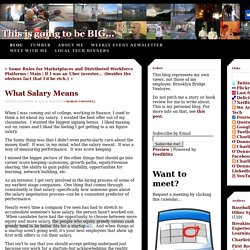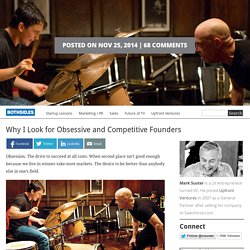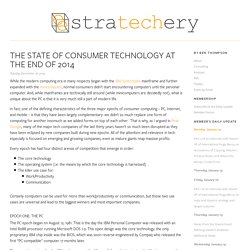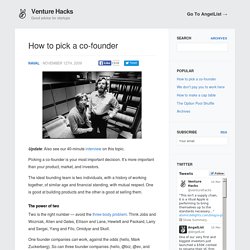

Last Issue of 2014! Startup Salary, Next Marketplaces, Obsessive Founders, Diversification Equals Mediocrity, How To Pick Cofounders. First Round 2014 Holiday Parody Video - All About Burn Rate. What Salary Means. When I was coming out of college, working in finance, I used to think a lot about my salary.

I wanted the best offer out of my classmates. I wanted the biggest signing bonus. I liked maxing out on raises and I liked the feeling I got getting to a six figure salary. The funny thing was that I didn't even particularly care about the money itself. It was, in my mind, what the salary meant. I missed the bigger picture of the other things that should go into career score keeping--autonomy, growth paths, equity/revenue sharing, the ability to gain public visibility, opportunities for learning, network building, etc. As an investor, I get very involved in the hiring process of some of my earliest stage companies. Nearly every time a company I've seen has had to stretch to accomodate someone's base salary, the person hasn't worked out. At the end of the day, we could all make a lot more money at hedge funds and banks anyway, right?
They see what's going on and they just don't care. Why I Look for Obsessive and Competitive Founders. Obsession.

The drive to succeed at all costs. When second place isn’t good enough because we live in winner-take-most markets. The desire to be better than anybody else in one’s field. This blog started from a series of conversations I found myself having over and over again with founders and eventually decided I should just start writing them.It would often make my colleagues laugh because they’d hear me like a broken record and then the next week read my ramblings in a post.
Last week’s obsession was about obsession itself. The State of Consumer Technology at the End of 2014. While the modern computing era in many respects began with the IBM System/360 mainframe and further expanded with the minicomputer, normal consumers didn’t start encountering computers until the personal computer.

And, while mainframes are technically still around (while minicomputers are decidedly not), what is unique about the PC is that it is very much still a part of modern life. In fact, one of the defining characteristics of the three major epochs of consumer computing – PC, Internet, and mobile – is that they have been largely complementary: we didn’t so much replace one form of computing for another insomuch as we added forms on top of each other.1 That is why, as I argued in Peak Google, many of the major tech companies of the last thirty years haven’t so much been disrupted as they have been eclipsed by new companies built during new epochs. Every epoch has had four distinct arenas of competition that emerge in order: Epoch One: The PC The PC epoch began on August 12, 1981.
The Emergence Of The End-to-End Marketplace. Why Diversification Results In Mediocrity. “Diversification is a protection against ignorance.

It makes very little sense for those who know what they are doing.” -Warren Buffet While there is unquestionably some truth to the idea that the world is often too random to literally make just one bet, the widely held assumption that diversification is a free lunch is just plain wrong. Just as there is benefit to be derived from diversification with respect to risk, there is a cost, too — that of losing whatever edge you might have been able to gain from skill. Diversification is a strategy to regress to the mean — that is, to be average.
Regression towards mediocrity The notion of regression comes from Sir Francis Galton‘s “Regression Towards Mediocrity in Hereditary Structure.” Figure 1 shows the tension between the “edge” gained by focus (y axis) and the gains from making numerous “bets” (x axis). Figure 1: Investment Edge vs. However, if you’re trying to earn excess returns or build a great product, diversification is the enemy. How to pick a co-founder. Naval · November 12th, 2009 Update: Also see our 40-minute interview on this topic.

Picking a co-founder is your most important decision. It’s more important than your product, market, and investors. The ideal founding team is two individuals, with a history of working together, of similar age and financial standing, with mutual respect. One is good at building products and the other is good at selling them. The power of two Two is the right number — avoid the three-body problem. One founder companies can work, against the odds (hello, Mark Zuckerberg). Two founders works because unanimity is possible, there are no founder politics, interests can easily align, and founder stakes are high post-financing. Someone you have history with You wouldn’t marry someone you’d just met. One builds, one sells The best builders can prototype and perhaps even build the entire product, end-to-end. The seller doesn’t have to be a “salesman” or “business guy”.